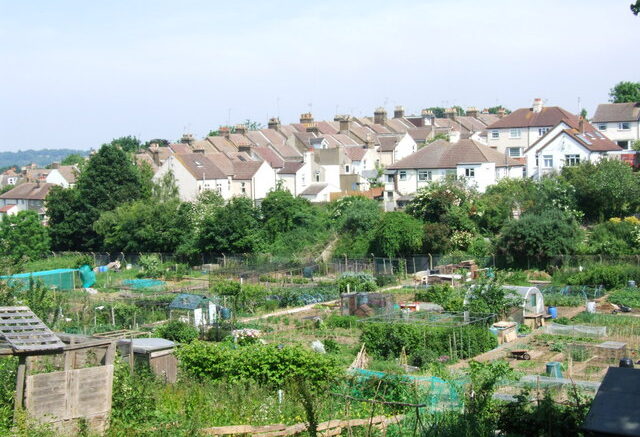The Government’s Attack on Allotments
Angela Rayner, in her role as Housing Secretary and Deputy Prime Minister, has quietly approved the sale of at least eight allotment sites since Labour entered government. A move that sends a clear message to communities: when it comes to balancing the books, even our most cherished green spaces are up for grabs now.
You could start giving the Deputy Prime Minister, a new title,
‘Rayner the Allotment Destroyer’
Councils, crippled by years of chronic underfunding and now facing an £8 billion shortfall by 2029, have been granted “flexibility” to dispose of local assets to cover day-to-day expenses.
This isn’t a fix. It’s a fire sale. and allotments, long considered sacred spaces in working-class communities, are some of the first to go under the hammer. The idea that such disposals are done in the “best interests of local residents” is insulting.
What we are seeing is the systematic dismantling of community infrastructure under the pretence of fiscal necessity. Behind each “asset” being sold off lies a real community, real people, and irreplaceable social value. The sale of allotments in Storrington (West Sussex), Ashfield (Nottinghamshire), and Bolsover (Derbyshire) tells a darker story than mere land transactions. It is a story of lost heritage, broken communities, and short-termism disguised as responsible governance.
Allotments are not just patches of soil. They are vital components of local life. They offer sanctuary, sustainability, self-sufficiency, and solace. Their removal is an act of social vandalism.
Let’s be clear: allotments matter. More than ever.
In an era of rising food insecurity, mental health crises, and ecological collapse, the role of allotments should be expanding, not shrinking. These green spaces are crucial not just to the individuals who tend them, but to entire communities. Their value is far more than economic; it is social, environmental, educational, and cultural.
From a biodiversity standpoint, allotments are ecological goldmines. They act as vital corridors for wildlife, nurturing pollinators, birds, and native species that would otherwise struggle to survive in increasingly urbanised and intensively farmed landscapes.
Natural England classifies them as part of our essential “Green Infrastructure”, a network of spaces that reduce air pollution, provide climate resilience, and support nature recovery.
The soil quality of allotments is often dramatically better than that of industrial farmland. That means fewer chemicals, more organic growing, and stronger local food networks. Per square metre, allotments can support greater ecological diversity than commercial farmland. That’s not a luxury, it’s a lifeline for a sustainable future.
Socially, allotments are hubs of inclusion. Projects up and down the country are using them for mental health therapy, community cooking, disability access gardening, youth education, and green social prescribing by GPs. Allotments don’t just grow food, they grow cohesion, confidence, and community spirit.
They’re particularly important for those without gardens, especially in towns and cities where private green space is scarce. To rip up allotments in these areas is to widen the green inequality gap.
More Land for Homes, Less Food for the Poorer
The Conservative MP for Braintree may have been trying to score a political point when he accused Labour of showing “complete disdain for protecting valued green spaces,” but he’s not wrong in his critique. This policy is a kick in the teeth to people with no other access to growing space.
The benefits for physical and mental health are irrefutable. Gardening supports cardiovascular health, improves balance and strength in older adults, and can slow cognitive decline. Mentally, time on the plot can reduce anxiety, combat loneliness, and foster a sense of peace and purpose. Studies across the world have consistently shown that access to green space correlates with better health outcomes. In some cases, the benefits are equivalent to being five years younger.
Let’s also not forget the personal pride and economic value of growing your own food. For many plot-holders, their allotment is a lifeline in managing the cost of living. One well-managed plot can supplement a family’s weekly shop with healthy, fresh produce throughout the year. In a time of rising prices, food bank queues, and climate-driven supply shocks, this is not just quaint tradition, it’s food security.
So why are these spaces being sold?
Why? It appears that local authorities have been backed into a corner by central government. But instead of offering new solutions, such as giving councils the power to raise local revenue or ringfencing green assets, this Labour Government has continued the tired policy of sell-offs, quietly approving what amounts to land clearances for cash.
Let’s be honest: allotments aren’t being sold because they’re useless. They’re being sold because they’re valuable, and developers want them.
Selling Our Veg to Please the Surveyor
The betrayal of community allotments is a betrayal of the very people Labour claims to stand for, those with little land of their own, those facing hardship, and those trying to grow something better for themselves and their communities. It is clear that this government does not care for the worker of England!!
This government is not short of evidence about the benefits of allotments. It is short of imagination, courage, and respect for the people who rely on them. Instead of investing in the long-term health of our communities, it is sanctioning the sale of our shared heritage for the illusion of short-term solvency.
Rayner Reaps What We Sow, But Leaves the Rest of us Nowhere to Grow
We should be creating more allotments, not fewer. We should be embedding them into school curriculums, health systems, and community design, not bulldozing them for speculative housing developments or balancing books on the backs of green spaces.
Allotments are not relics of the past. They are building blocks of a better, fairer, greener future. And we will regret every one we lose.

